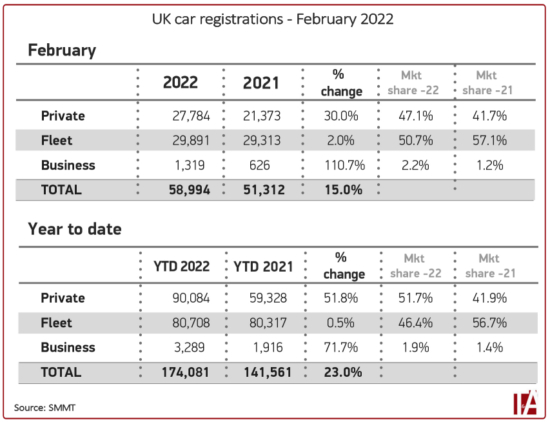UK car registrations up 15% in February

According to figures from the Society of Motor Manufacturers and Traders (SMMT), UK new car registrations rose by 15.0 per cent in February as 58,994 new cars joined Britain’s roads. This rise of 7,682 units was in comparison with the same month in 2021, when the pandemic shut car showrooms across the UK – registrations are down 25.9 per cent on pre-pandemic levels, as vehicle supply remains constrained by semiconductor shortages.
Compared with February 2021, when showrooms were closed and only ‘click and collect’ permitted, private registrations rose by 30.0 per cent. Large fleet registrations remained stable, up just 2.0 per cent, indicating that in a supply-constrained market, manufacturers are also prioritising private customers, which accounted for more than 80 per cent of growth. While business purchases grew by 110.7 per cent, this equates to a rise of just 693 units.
It was another bumper month for battery electric vehicles (BEVs), which took a 17.7 per cent market share to reach 10,417 units, while registrations of plug-in hybrids (PHEVs) rose to 4,677 units and a 7.9 per cent share of the market. When combined with hybrid (HEV) registrations (6,883), electrified vehicles accounted for more than a third of all new cars leaving dealerships. While this demonstrates the growing demand for electric cars, February is typically the lowest volume month, as many buyers delay purchases until the ‘new plate’ month of March, and fluctuations in supply for some key models can have a more pronounced effect in terms of market share.
Consumers switching to EVs
“Despite February’s traditional low registration numbers, consumers are switching to EVs in ever-increasing numbers,” comments Mike Hawes, SMMT chief executive. “More than ever, infrastructure investment needs to accelerate to match this growth. Government must use its upcoming Spring Statement to enable this transition, continuing support for home and workplace charging, boosting public chargepoint rollout to tackle charging anxiety and, given the massive increase in energy prices, reducing VAT on public charging points. This will energise both consumer and business confidence and accelerate our switch to zero emission mobility.”


 Cam International
Cam International

Comments